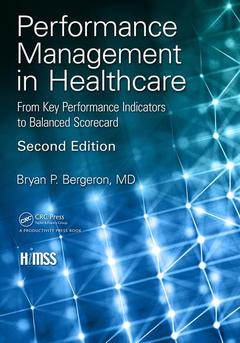Performance Management in Healthcare (2nd Ed.) From Key Performance Indicators to Balanced Scorecard HIMSS Book Series
Auteur : Bergeron Bryan P.

Performance management, often referred to as process management, is a strategy that can be used to achieve an optimum mix of quality, safety, patient satisfaction and solvency. The basis of performance management is the effective use of resources, as measured by quantifying processes and outcomes using key performance indicators (KPIs) ? core measures that gauge the performance of an organization in particular areas. There is more to performance management than selecting a few KPIs from a list and feeding them into a graphical dashboard system. It?s about behavior change, leadership, and vision.
Written for administrators, clinical staff, process improvement managers and information technology personnel of healthcare organizations, this second edition provides the knowledge necessary to provide the leadership and vision for a performance measurement initiative. This practical resource provides a high-level review of the quality/safety initiatives in healthcare, describes the implementation process from an IT perspective, and offers high-level clinical, financial and cultural details. It features an extensive listing of clinical and non-clinical KPIs: a glossary including financial, medical, and operational terms; and appendices of organizations and sources of indicators and benchmarks.
Preface ; Chapter 1: Overview; Chapter 2: Performance Management Cycle; Chapter 3: Key Performance Indicators; Chapter 4: Non-Clinical Indictors; Chapter 5: Clinical Indicators; Chapter 6: Benchmarks; Chapter 7: Reporting; Chapter 8: Behavior Change; Chapter 9: Statistics; Appendix A: Healthcare Quality Organizations; Appendix B: AHRQ Proposed Final Measurement Set; Appendix C: AHRQ QualityTools™ Holdings; Appendix D: AHRQ QualityTools™ Template; Appendix E: NHS Acute Trust KPIs; Appendix F: NHS Primary Care Trusts KPIs; Appendix G: NHS Ambulance Trust KPIs; Appendix H: NHS Mental Health Trust KPIs; Appendix I: NHS Balanced Scorecard Indicators; Appendix J: ACR Appropriateness Criteria™ Topics; Appendix K: CAP Q-Tracks Quality Monitors; Appendix L: National Quality Forum Safe Practices; Appendix M: Oasis Quality Measures; Appendix N: ISO IWA 1; Appendix O: Baldridge Award Criteria; Acronyms; Glossary
Bryan Bergeron, MD, writes, speaks and consults about business technology and the intersection of computers and medicine. A Fellow of the American College of Medical Informatics and the author of more than two dozen books, several hundred articles, and a dozen software packages, Bryan’s expertise extends from robotics to digital-data management and from medical informatics to modeling and simulation. He is named inventor on eleven US patents, including several on Translational Reality. Bryan has held a variety of different teaching and administrative positions at Harvard Medical School, MIT, and HST and Massachusetts General Hospital Institute for Healthcare Professionals – from Research Affiliate to Acting Director, and has taught courses ranging from cardiovascular pathophysiology and pulmonary pathophysiology to healthcare informatics. For the past twenty years, he has headed Archetype Technologies Inc., which specializes in the development and evaluation of new technologies and intellectual property.
Bryan has worked with technology startups in areas ranging from surgical robotics and artificial intelligence to user-interface design and 3D modeling and simulation. As chief scientist, he designed and developed avatar-based clinical simulations, leveraging voice recognition and medical expert systems. He also designed and developed intelligent tutoring systems and serious games for training military and civilian first responders for nuclear, chemical and biological events.
Bryan founded his first company, Home Health Software, in 1984, with several commercially successful software titles. This was followed by HeartLab, the first commercial multimedia patient simulator on a microcomputer. In addition to software, Bryan has designed and developed microprocessor-based hardware and specialized sensors.
He has successfully secured and directed grants from the National Institutes of Health (NIH), Small Business
Date de parution : 01-2018
17.8x25.4 cm
Date de parution : 12-2017
17.8x25.4 cm
Thèmes de Performance Management in Healthcare :
Mots-clés :
CPOE System; Performance Management Initiative; initiative; Computerized Provider Order Entry; Bryan P; Bergeron; King Faisal Specialist Hospital; Performance Management Committee; Net Patient Revenue; Cpt Code; Nonclinical Indicators; Clinical Quality Measures; England’s NHS; TTS; Bi Reporting; Average Inpatient Cost; Eligible Professional; PQIs; CME Program; KPI Data; AHD; AHRQ Website; Medicine’s Medical Subject Headings; Hypothetical Hospital; KPI Value; ICD-10 Code; EMR System; Roc



